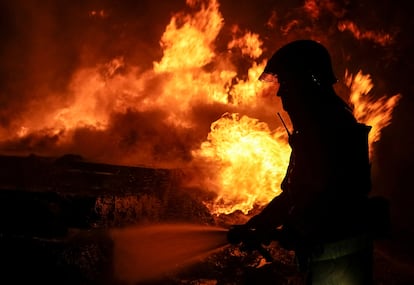The fury of the Russians in Ukraine
The resentment caused by the collapse of the Soviet Union continues to provide the fuel for Vladimir Putin’s imperial project

Russian troops continue to advance in the Donetsk and Kharkiv provinces and the war continues in Ukraine, although it seems more and more distant and strange. It is almost exactly two years since Vladimir Putin’s forces attempted in February 2022 to reach Kyiv to install a puppet government that would obey the Kremlin’s designs, expanding the war that began in the provinces of Donetsk and Luhansk in 2014 to the rest of the country. It was something you could have seen coming, had you taken seriously the bluster of some of the protagonists of what was happening in the Donbas region of eastern Ukraine. “Give me two years and in Ukraine, no one will say they are Ukrainian,” the prime minister of the Donetsk People’s Republic (DPR), Aleksandr Zakharchenko, told Pilar Bonet in March 2017, during a long conversation that the journalist, who was for many years a correspondent in the Soviet Union and the Russian Federation for this newspaper — to which she continues to contribute — recounts in her book Náufragos del imperio (Castaways of the Empire).
Zakharchenko, who spoke of himself as a hero with “burning, angry eyes,” and who was killed in a bomb attack on August 31, 2018, explained to Bonet that Russians have much more in common with the Mongols than with the Swedes: “Russia is a country of victors who have learned to survive. We survive everywhere; we may starve for a whole week, be wounded and covered in mud, but, crawling and ragged, we will defend our land.” “The war is already a reality,” he added. “All of Ukraine must be transformed into the DPR. When we succeed, a flood of hundreds of thousands of armed Ukrainians will rush into Europe, and they will not be refugees like those from Libya or Syria, but people with combat experience, well-trained and well-equipped.”
Náufragos del imperio is full of stories of people suffering the horror of the Russian invasion, and is constructed from the unpublished workbooks, travel diaries, and materials that Bonet has been collecting since then. “Those who want to go to Sakhalin, to the right. Those who want to go to Vladivostok, to the left,” shouted the employees of the civil protection service of Simferopol, the capital of Crimea, in the face of the avalanche of refugees arriving from Donbas in August 2014. They had to decide, in an instant, between two places to start anew. Lives broken, massacred, forcibly pushed into exile. With Putin’s invasion in 2022, things got even worse.
Zakharchenko admitted to Bonet during their first meeting in 2014 that he was “proud to feel Ukrainian.” Three years later, he had become a Russian, enthusiastic about Putin’s project. Bonet looks back to the collapse of the Soviet Union, when there was a “brutal shift from a planned, centralized economy to a capitalist economy.” Privatizations were an opportunity for the old order to modernize, but they were “ruthless.” “Solidly established industries were turned into rubble and scrap metal; workers who thought they had stable jobs were left on the street, and highly qualified specialists had to retrain as shopkeepers or cab drivers.” The fury left by that fall is still intact. Putin exploits it, and is confident of prolonging the war in Ukraine until he can win it. That is where we are.
Sign up for our weekly newsletter to get more English-language news coverage from EL PAÍS USA Edition
Tu suscripción se está usando en otro dispositivo
¿Quieres añadir otro usuario a tu suscripción?
Si continúas leyendo en este dispositivo, no se podrá leer en el otro.
FlechaTu suscripción se está usando en otro dispositivo y solo puedes acceder a EL PAÍS desde un dispositivo a la vez.
Si quieres compartir tu cuenta, cambia tu suscripción a la modalidad Premium, así podrás añadir otro usuario. Cada uno accederá con su propia cuenta de email, lo que os permitirá personalizar vuestra experiencia en EL PAÍS.
¿Tienes una suscripción de empresa? Accede aquí para contratar más cuentas.
En el caso de no saber quién está usando tu cuenta, te recomendamos cambiar tu contraseña aquí.
Si decides continuar compartiendo tu cuenta, este mensaje se mostrará en tu dispositivo y en el de la otra persona que está usando tu cuenta de forma indefinida, afectando a tu experiencia de lectura. Puedes consultar aquí los términos y condiciones de la suscripción digital.









































